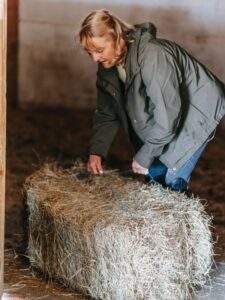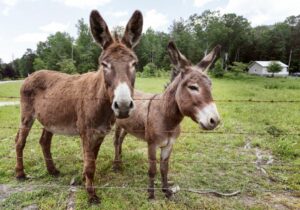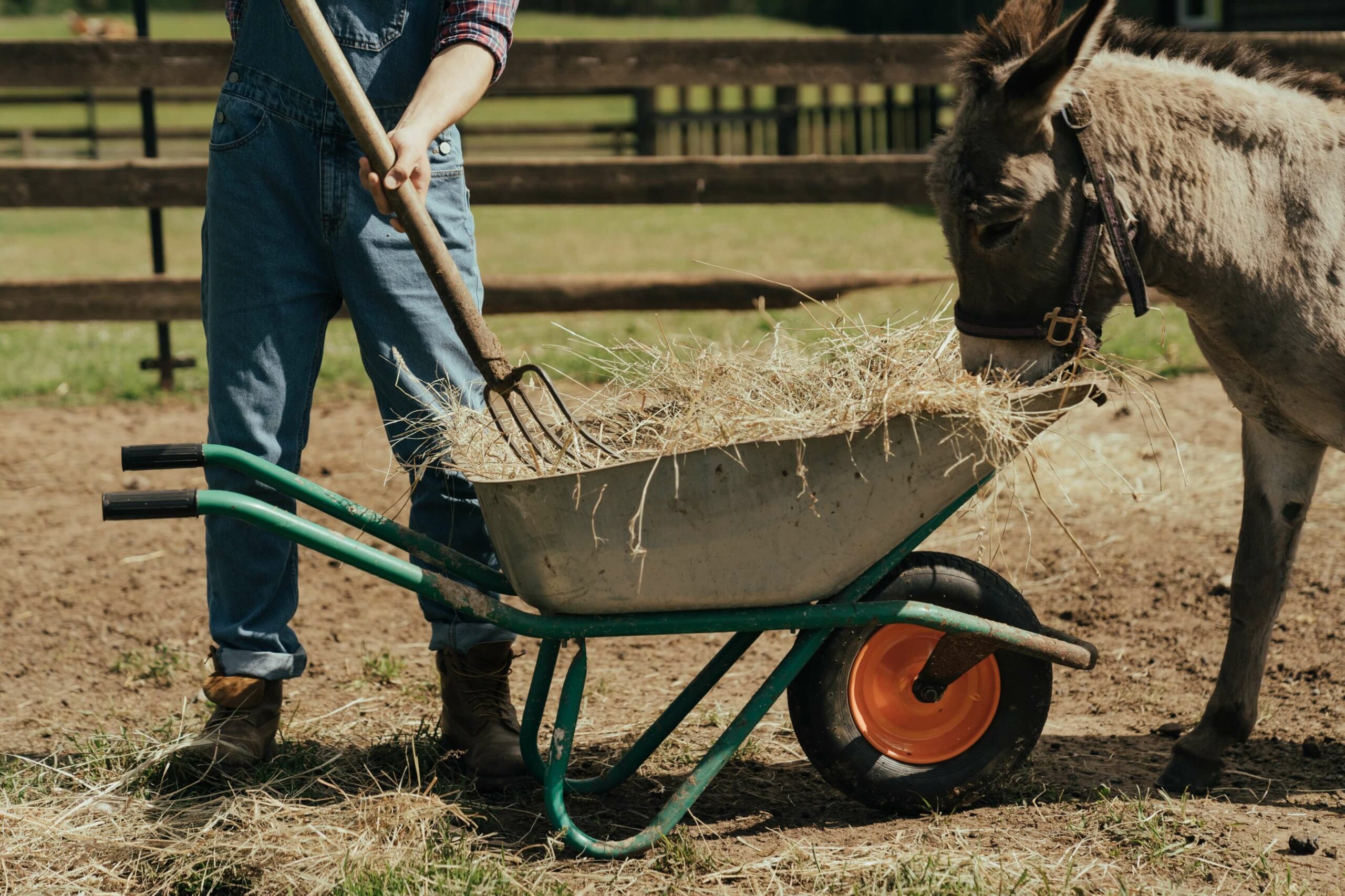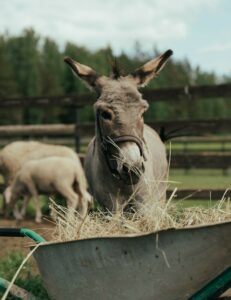Donkeys are hardy animals that can endure a wide range of climates and terrain, but they still require a balanced diet to stay healthy and proper nutrition to maintain their health.
An important part of a donkey’s diet is hay. It provides donkeys with essential nutrients and can help keep them healthy in several ways.
The following are some of the benefits of feeding the donkey hay:
- It helps keep their digestive system healthy. The long fibers in hay help promote regular bowel function and prevent digestive problems such as colic, respiratory, and joint problems.
- Since hay is a good source of fiber, which is essential for maintaining a donkey’s overall health, fiber also helps keep the donkey’s coat healthy.
- Hay provides necessary nutrients that a donkey needs for good health, including vitamins, minerals, and protein.
- Hay helps keep a donkey’s teeth healthy and strong. The abrasive action of chewing hay helps wear down a donkey’s teeth, preventing dental problems such as overgrown or sharp teeth.
- It can also help keep donkeys hydrated, especially in hot weather. The high water content in hay helps keep donkeys hydrated and prevents health problems such as dehydration.
- The hay’s nutrients can help strengthen a donkey’s immune system and reduce the risk of health problems.
- Hay can also provide them with mental stimulation and help prevent boredom.
Different types of hay
There are various types of hay that you can provide to donkeys. The type of hay you feed them will depend on the donkey’s individual needs and preferences.
Here are some of the common types of hay:
Alfalfa hay: Alfalfa hay is a good source of protein and nutrients, and you can feed this to donkeys of all ages. It is especially high in calcium, essential for growing young donkeys.
Timothy hay: Timothy hay is a good option for adult donkeys. It is lower in calcium than alfalfa hay and is a good source of fiber.
Orchard grass hay: Orchard grass hay is a good option for donkeys that are easy keepers or prone to obesity. It is lower in calories than other types of hay, but it still provides the donkeys with essential nutrients.
Bermuda grass hay: Bermuda grass hay is a good option for donkeys in hot, humid climates. It is high in fiber and helps to keep the donkeys hydrated.
Meadow hay: Meadow hay is a good option for donkeys that need a high-fiber diet. It is also a good choice for donkeys in cold climates, as it is higher in calories than other types of hay. You can feed donkeys of all ages with Meadow hay.
Other types of hay are also available, so make sure you choose one suitable for your donkeys.
Choosing hay for the donkey
When choosing hay for your donkeys, it would be best to consider a few things. First, the type of hay you choose will depend on several factors.

When selecting hay for your donkey, there are several factors to consider:
The donkey’s age: The type of hay you feed your donkey will depend on their age. While young, growing donkeys require high-calcium hay, adult donkeys can be fed lower-calcium hay.
The donkey’s health: choosing hay for your donkeys will also depend on their overall health. Donkeys prone to obesity or those with digestive problems may need a different type of hay than healthy donkeys.
The activity level of the donkey: Choosing the type of hay to feed them will also depend on their activity level. A more active donkey may need a different kind of hay than those that are less active.
The quality of hay: You should also consider the quality of the hay when choosing one for your donkeys. Hay should be cut at the proper stage of maturity to ensure that it contains the right amount of nutrients.
The type of hay: There are various types available, and each type has its benefits. Some types of hay are more nutritious than others, while some are better for dental health. Choose a variety of hay that will best meet your donkey’s needs.
The size of the hay: Donkeys come in various sizes, so it’s vital to choose hay that is the right size for your donkey. If the hay is too big, your donkey may have difficulty eating it. On the other hand, if the hay is too tiny, your donkey may not be able to get all of the nutrients it needs.
Storage: Hay can take up a lot of space, so choosing hay that you can store easily is essential. If you have limited space, you may want to select hay compressed into smaller bales.
The climate: The type of hay you feed your donkey will also depend on the environment. Donkeys in hot, humid climates may need a different kind of hay than those in cooler temperatures.
Cost: You should also consider the cost of the hay when choosing it for your donkeys. Hay is a significant expense for donkey owners, so you will want to select an affordable type of hay that still provides the donkey with the nutrients they need.
Donkeys are individuals, so what works for one donkey may not work for another. Therefore, it’s essential to experiment with different types of hay to find what works best for them, and you can consult with a veterinarian or equine nutritionist if you’re not sure what hay is best for your donkeys.
When you have already selected the type of hay that is best for your donkey, the next thing you need to consider is ensuring you are feeding them properly and safely.
Listed below are some tips for storing, handling, and feeding hay to a donkey:
How often should you feed your donkeys with hay?
You should feed your donkeys hay at least once a day. The amount of hay you feed your donkeys will depend on their age, health, and activity level.
Young, growing donkeys need more hay than adult donkeys. Donkeys that are pregnant or nursing also need more hay than those that are not. Donkeys that are less active will also require less hay than those that are more active.
When is the best time to feed hay to donkeys?
The best time to feed hay to your donkeys is in the morning and evening. If donkeys are fed hay in the morning, they are less likely to overeat, and they are more likely to consume all of their food. Donkeys fed hay in the evening are likely to have a full stomach and be less active, which helps prevent digestive problems.
How much hay should you feed your donkeys?
The amount of hay you feed your donkeys depends on their needs. Some donkeys may need more hay than others, and the amount of hay you provide will also depend on the type of hay you feed. But a general rule of thumb is offering 1-2% of the donkey’s body weight daily.
How should you store hay for your donkeys?
You should remember a few things while storing hay for your donkeys. First, hay is a perishable item and should be stored properly to ensure that it remains fresh and nutritious.
Make sure to store hay in a dry, well-ventilated area. Storing hay stored in a damp or humid environment can spoil and cause health problems for your donkey.
- Avoid storing hay near chemicals or other materials that could contaminate the hay.
- Make sure it is out of reach of rodents and other pests. Rodents can contaminate the hay with their urine and feces, making the donkey sick.
- Store the hay away from direct sunlight, as this can cause the nutrients in the hay to deteriorate.
- Inspect the hay before feeding it to your donkeys to ensure it is free of mold, dust, and other contaminants.
- You should feed the donkeys hay in a clean, dry place, like a hay manger or hay feeders.
- Provide the donkeys with plenty of fresh water to drink. Donkeys are prone to dehydration, so they always need access to fresh water.
- Monitor the donkey’s weight and body condition to ensure they get enough hay in their diet. If the donkey is losing weight or looking thin, you may need to increase the amount of hay you feed your donkey to eat.

Donkeys are a great addition to any farm; with the proper care, they can provide years of companionship and service.
And as you can see, feeding hay to your donkeys provides many essential benefits for their overall health and wellbeing. But you also need to make sure that you choose what’s best for your donkeys, when to provide them with hay, how much you should feed them, and ensure it is stored right for them. By following the tips mentioned above, you can ensure that your donkeys get the nutrition they need and stay healthy for years to come. And if you are not already feeding hay to your donkey, consider doing so to help them stay healthy and happy.
We hope this article has helped you understand hay’s benefits to your donkey, as well as precautions you should take to ensure your donkey is receiving the best of care. Thank you for reading!


